We are so excited to partner with the Toy Industry Association to bring you this post. Although there was compensation involved, I truly believe in their Genius of Play mission which is to engage children in meaningful play opportunities so they can grow and develop into well-rounded adults. This belief perfectly aligns with our beliefs at Mommy University; therefore, it is our pleasure to join forces with this great cause!
“Play is often talked about as if it were a relief from serious learning. But for children, play is serious learning. Play is really the work of childhood.”
– Mr. Rodgers
Our friendly neighbor, Mr. Rodgers, was a very smart and insightful man. Play IS learning for children. It allows them to acquire knowledge through observing, discovering and experimenting. Through play kids learn about themselves and about life. Whether it is structured or unstructured, play allows kids to develop important academic, cognitive, social and emotional skills.
There are so many forms of play from sports to crafting to board games but in this article I want to focus on the importance of pretend and imaginary play. Ever wonder what your child gets out of pretending to be a princess, a robot, a doctor, a cook or even pretending to be YOU? Did you know that as kids pretend to cook in their play kitchen, camp in a fort in the living room or run around as super heroes, they are enhancing skills needed for healthy development? To help parents understand the importance of pretend and imaginary play, I have put together this list of benefits.
Benefits of Pretend and Imaginary Play
Enhances Language Development
One of the greatest benefits of engaging in play based activities is the opportunity for language development. For pretend play in particular, kids learn to verbally express their ideas and opinions through this form of story telling. They build their vocabulary of descriptive words as they explain their setting and plot. When engaging in pretend play with friends and siblings, they also develop important social communication skills such as back and forth communication and listening skills.
Sparks Creativity
As soon as your child puts on the princess dress, chef hat or doctor’s coat, they begin imagining themselves as these characters. They create their own worlds full of excitement and fun. They find creative ways to use an old cardboard box or building blocks. We often see these objects for what they are, but kids see them as a trap to catch Big Foot or tools to make a cage for T-Rex!
Enhances Social Skills

When kids engage in pretend play with friends or siblings, they develop important social skills such as turn taking and sharing. They also learn teamwork and cooperation as well as listening to others and being supportive. Kids also learn they can’t always be the knight who saves the princess. Sometimes they have to play the role of the horse. Through play, kids learn they can’t always get what they want. These are all skills needed for school, sports, a career and in life!
Boosts Planning and Organizational Skills
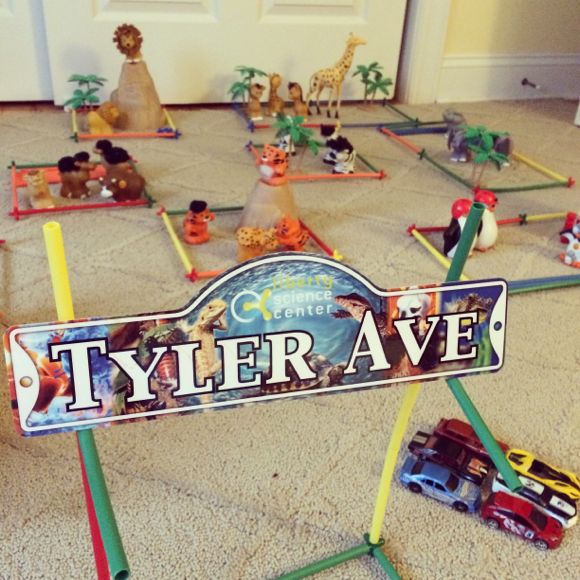
As kids play, they often plan out their scenarios. They also organize their toys in specific ways so their imaginary world can come to life. This teaches kids to use thinking and problem solving skills as well. When my son plays, he often plans everything out before his game or story can begin. I love watching him because I can almost see the wheels turning as he plays!
Increases Independence
When kids engage in pretend and imaginary play, they learn to create their own worlds and stories that are separate from that in which they live with their parents. They learn how to entertain themselves which leads to them being more independent individuals. Playing also helps children find out their likes and dislikes and teaches them how to make choices.
Allows for Self-Expression
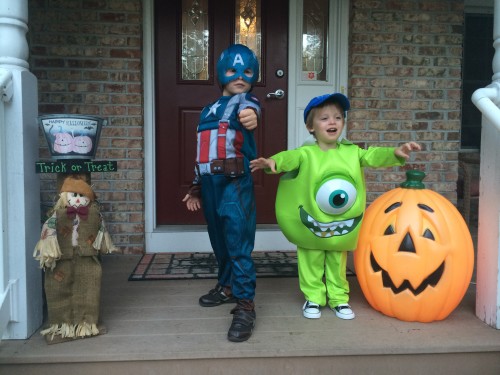
Through play, kids can express their likes, dislikes, needs and wants. They can pretend to be what they want to be when they grow up or emulate their favorite super hero. When playing, kids are able to express how they feel about certain situations and circumstances in their lives. Play therapy is one the best ways to get young children to express their feelings during difficult events. Kids often feel more comfortable in the play environment than “talking something out.” So pay attention when your kids are playing! They might be trying to tell you something important!
Enhances Story Telling Skills
As kids engage in pretend and imaginary play, they create their own magical and unique worlds. Whether it’s their own restaurant or a far away land with dragons and knights, they are creating a story. They tell their story through play and through words. Play helps develop these story telling skills which will be needed in school and a possible career such as being an author, screen writer or ad designer.
Helps Develop Life Skills
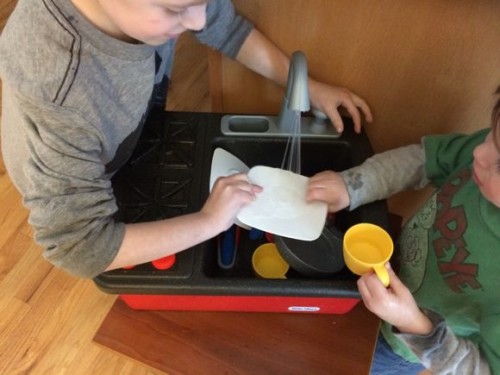
Believe it or not but engaging in pretend play, especially role-playing, helps kids learn and develop important life skills. Not only do they learn turn taking and sharing as stated above, but they can also learn how to care for others, set a table, wash dishes and tie their shoes. When your child plays with her baby doll, she learns to be gentle and loving towards babies. When your child plays doctor, he learns the very important concept of empathy. When they play in their pretend kitchen, they learn basic cooking and cleaning concepts.
Fosters Leadership Qualities
For many children, pretend play helps children become leaders. As I watch my son play with his brother, friends and even peers he meets in the park, I am amazed as he leads the kids in play. He often decides what game they will play and what character each person will be. Your child is not the leader? That’s a teachable moment too. When kids listen to the child in charge, they learn how to listen and follow directions. Being an effective leader AND follower is needed in school and future careers!
Teaches Social Norms
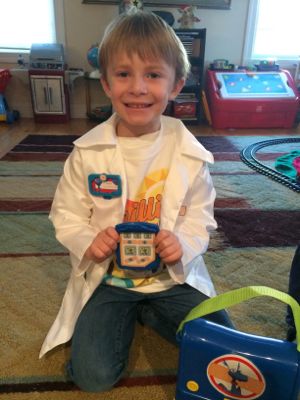
Pretend play is a wonderful way to teach children about social norms and concepts. For many children, play is how they learn how to behave in the real world. Pretend play activities such as role-playing help kids understand concepts such as how to behave at a restaurant, what to do if there is a fire or how to react if they see a stranger. It can also help lessen the anxiety for situations such as visiting the doctor, flying in a plane or going to a new school. Creating social stories like these through the use of pretend play are very beneficial for little kids as well as those with developmental delays. In fact, social stories have been found to be quite effective when working with children on the spectrum.
As you can clearly see, pretend and imaginary play have very important roles in child development. Check out this video from Genius of Play to see some pretend play in action:
I have recently taken the Genius of Play’s Play Pledge so now it is your turn! All you have to do is pledge a specific amount of hours per week to dedicate to play. This shows that you recognize the importance of play in your child’s development. Once 1,000,000 hours have been pledged, a charitable donation to the Toy Bank will be made! Take your pledge right here!
For more information follow the Genius of Play campaign:
You may also enjoy:
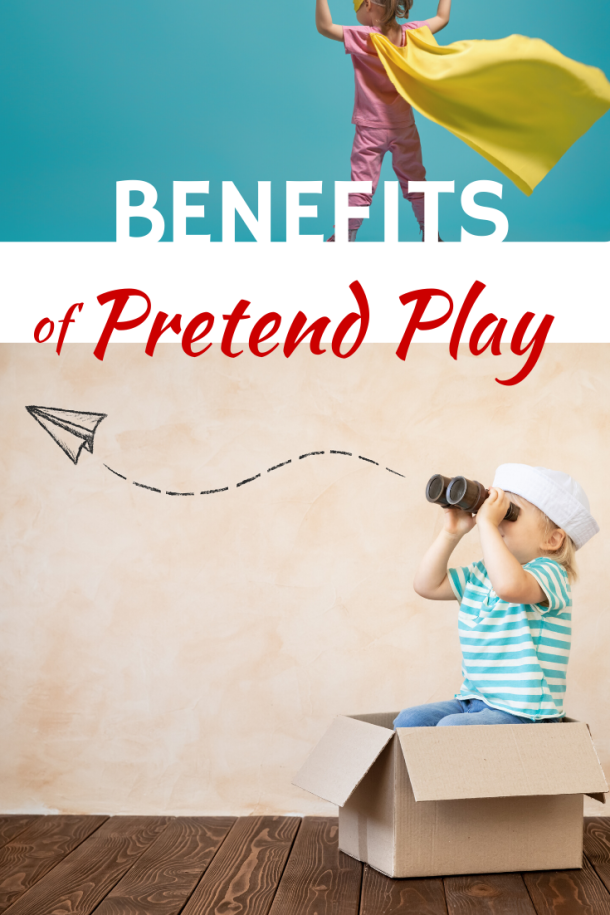

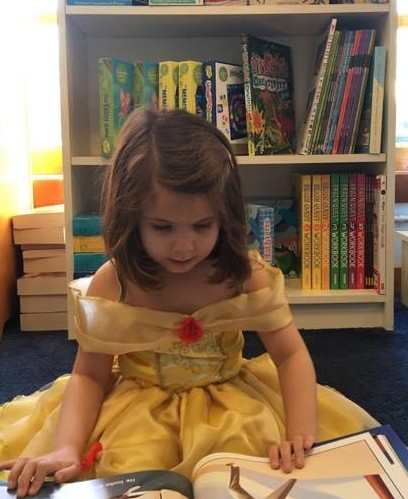
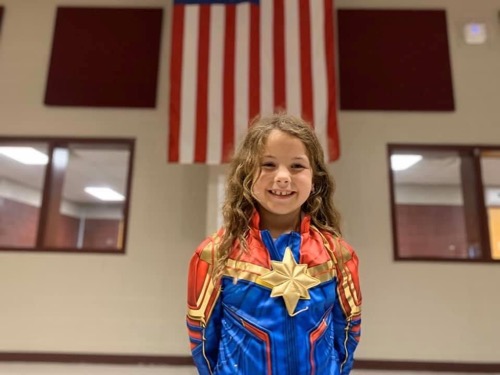
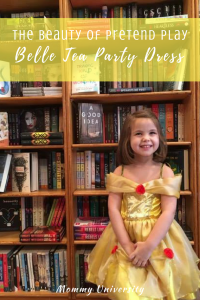
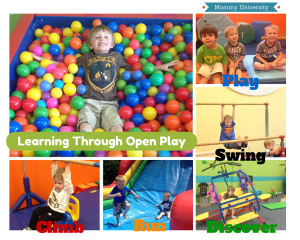
Thank you for this article! I think people understand the importance of play. My daughter who has autism and sensory issues, never properly played with her toys when she was a tot. She was obsessed with cars, wheels and hinges and lining things up. Now that she’s nearly 10, I’ve had the pleasure of watching her develop her play skills to the point where she plays with everything properly! And while she still has a soft spot for car toys, she loves playing with her dolls, stuffed toys, kitchen toys, building toys like Legos, painting and dress up. It’s a beautiful thing to watch and as parents, we can’t underestimate the importance of play!
At the school where I teach, we just listened to a lecture from a brain research specialist, and she talked about this! It’s important for kids to try many different things, especially when they are young.
That sounds like a great lecture! I wish schools would allow more time for play!
My little guy just started participating more in pretend play and I love watching him! He has a little grill that he cooks up food and also seeing how he interacts with his trucks and cars shows how important it is to allow kids to pretend and use their imagination.
It must be so much fun to watch him play. I love watching my boys play with their pretend grill too:)
It is so important to highlight how significant play is in defining young children’s development. Children are naturally inquisitive and play encourages them to think outside the box and create their own imaginary world. http://www.fadedspring.co.uk
I agree! Play is a way to expand upon kids’ natural curiosity!
The benefits for imagination play are endless!! I love to watch my twins creating their own stories and scenarios!
That must be so much fun to watch!!
Imagination is a big part of childhood. I have many fond memories pretending as a child.
I have some great memories of coming up with stories with my sister. It is definitely a big part of childhood!
Ahh love this! I hope to always let my son play play play!! I studied early childhood development and education, where I learned SOOOO much about play’s importance!
Thank you so much! Play is so important for learning. I just wish it was more of a focus in school!
We spent a whole afternoon last week behind the couch putting on puppet shows. We created so many characters and stories and just really had a fabulous time using our imaginations!
That sounds like so much fun Julie!
My kids love pretend play. I have a hard time doing pretend play with them and find it so boring but I think that’s because my mind is always focused on my huge to do list.
LOVE this! We are really big on imaginary play in our house!